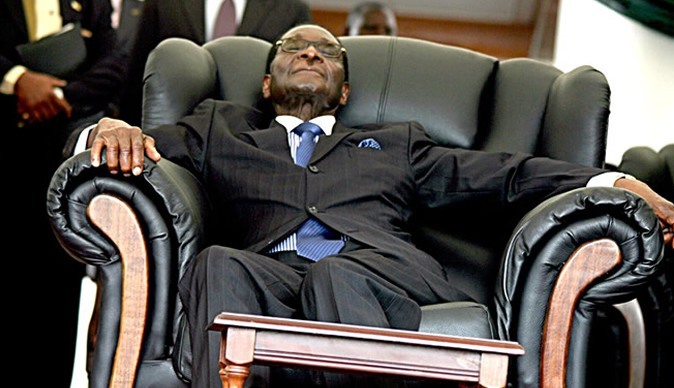
PRESIDENT Robert Mugabe turned 87 on Monday amid growing speculation about his health.
The issue, which has been badly handled by his spin doctors, is creating a great deal of discomfort in the corridors of power, including within Zanu PF ranks and securocratic structures.
It’s not difficult to understand why. The issue raises so many fundamental and sensitive political questions which authorities would prefer not to discuss, at least in public. The matter also lies at the heart of local politics and the future of the country.
Given Mugabe’s role and footprints in Zimbabwean politics since he joined the liberation movement around 1960, the issue of his health becomes critical, apart from his family and relatives, to the survival of Zanu PF and well-being of the nation.
Even though Mugabe and Zanu PF’s anachronistic ideology is fast eroding, and the myths and symbols of their system becoming increasingly unstable and gradually collapsing, he remains an influential figure in local politics and his continued presence or departure would shape the future of the country in significant ways.
The careers of so many influential political and even business elites in Zimbabwe are tied to Mugabe’s future and they would naturally become anxious about the discussion. Their economic fortunes and even security depends on his well-being. That is partly why Mugabe’s health is such a touchy subject to them.
- Chamisa under fire over US$120K donation
- Mavhunga puts DeMbare into Chibuku quarterfinals
- Pension funds bet on Cabora Bassa oilfields
- Councils defy govt fire tender directive
Keep Reading
Upon his return on Sunday from far-flung Singapore, Mugabe did not waste time before circuitously dealing with the matter.
After his spokesman claimed he had gone all the way to Singapore for a review after a “small medical (eye) procedure” last month during his annual holidays to remove a cataract, Mugabe weighed in to contain the debate and douse the fires.
Reacting to reports that his travels on health grounds were now disrupting government business, Mugabe said if there were people who thought “we have lost pace” cabinet could meet twice a week. Cabinet was postponed last week because of Mugabe’s trip to Singapore, which meant that by that time it had only met once – on February 8 — since the beginning of the year. Ministers say they are getting edgy about the issue.
However, there are some people around Mugabe who are not comfortable to openly discuss the issue. Mugabe’s state media hacks are also showing growing anxiety over it. One only needs to have read the ranting and raving in the last editorial comment of the state-controlled Sunday Mail, headlined Long Live President Mugabe!, to understand this.
With all due respect to the editors there, the comment was based on contextual misrepresentations and an undisguised Straw man argument. It was also laced with North Korean-style propaganda and excessive vitriol. The editor of The Voice (Zanu PF’s mouthpiece, and equivalent of Pravda) would have been green with envy after reading it. But then that’s beside the point. The real issue is that the health of a head of state is an issue of uncontestable public interest. Few things, if any, demand greater accountability to Zimbabweans than the president’s state of health.
The fiasco which surrounded the deteriorating health and later death of Nigerian President Umaru Musa Yar’Adua should teach us a lesson. The president and his spokesmen denied for two years he had any health problems and even threatened to sue the media, but then we now all know what happened later.
So let’s not have a boiling frog syndrome when dealing with such serious issues.
In the United States they have had to find a way of striking a delicate balance between the public’s obvious interest in the health of its next president and the candidate’s need to retain some measure of privacy.
Questions about the health of a prospective president are more acute with age. John McCain, who has suffered bouts of skin cancer and was 72 in 2008 while contesting against US President Barrack Obama, had to release 1 173 pages of medical records spanning eight years to reassure the public he was fit for office. This material was on top of copious medical records — including psychiatric evaluations — which McCain had made available to the media during his 2000 campaign.
History counsels that, as a general rule, the public’s interest should be paramount. Franklin D Roosevelt’s failing health as he ran for a fourth term, John F Kennedy’s Addison’s disease and Paul Tsongas’s recurrence of the lymphoma, which would have killed him during his first term, are some examples, among many, to learn from.











